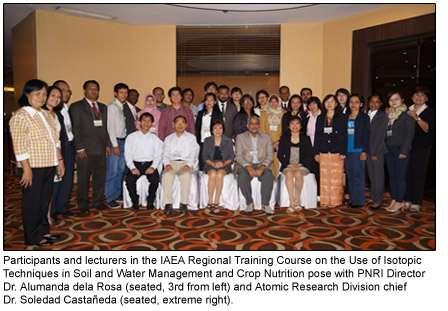
The Philippine Nuclear Research Institute – Department of Science and Technology (PNRI-DOST) hosted a regional training course on the use of nuclear techniques in agricultural management at the Crowne Plaza Hotel Manila in Ortigas Center, Pasig City from September 23-27.
The training course, which was organized by the International Atomic Energy Agency (IAEA), aimed to introduce and highlight the advantages of isotope techniques in providing better assessments of soil, water and crop nutrients, which are vital to improving agricultural productivity in Asia.
“For most of the participating countries, agriculture forms a major part of their economy, and a significant number of the population depends on agriculture for their livelihood,” said PNRI Director Dr. Alumanda dela Rosa.
“In the last two decades, much pressure bears upon the agricultural sector for three major reasons: expanding population but decreasing hectarage of land devoted to agriculture, increasing cost of inputs and the impact of climate change. We scientists can only influence the last two factors with our studies.”
Most of the 22 foreign participants were researchers and members of the academe from neighboring Asian countries – Bangladesh, China, India, Indonesia, Korea, Malaysia, Mongolia, Myanmar, Pakistan, Sri Lanka, Thailand and Vietnam. Observers from Cambodia also attended the training sessions.
Also among the participants were representatives of government agencies and research institutions such as the Bureau of Soils and Water Management, Philippine Rice Research Institute, and PNRI.
The lecturers were Dr. Yong Li of the Institute for Agro-Environmental and Sustainable Development – Chinese Academy of Agricultural Sciences and Dr. Khalid Mahmood of the Nuclear Institute for Agriculture and Biology – Pakistan Atomic Energy Commission, who shared their expertise in nutrient management for soils, water and crops and the application of isotope techniques to help identify and solve agricultural problems.
The training course director for the week-long seminar was Roland Rallos, science research specialist of PNRI’s Agricultural Research Section.
A smart-farming advocate and an isotope techniques specialist himself, Rallos is the National Project Coordinator for RAS 5056, a technical cooperation project conceived by the joint program of the Food and Agriculture Organization and the IAEA for the Asia-Pacific region.
Beyond improving agricultural productivity, the course was also intended to strengthen ties between scientists of neighboring countries and help establish new linkages with other research and development networks.
“The Philippines is always very enthusiastic to host these events not only because of the relevance of food security in our region, but also because it is an opportunity for us to raise the level of communication and collaboration among member states in the region under this project,” said Dr. Soledad Castañeda, head of the PNRI Atomic Research Division.












































